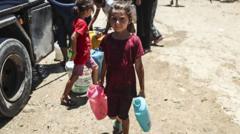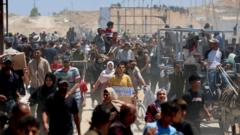The Bangladeshi police have arrested Ataullah, leader of the Arakan Rohingya Salvation Army (ARSA), amid concerns of armed insurgency within Rohingya refugee camps. This development raises questions regarding the impact on security and humanitarian conditions for over a million Rohingya refugees in Bangladesh.
Arrest of Rohingya Armed Leader Sparks Debate on Regional Security

Arrest of Rohingya Armed Leader Sparks Debate on Regional Security
The recent arrest of the ARSA leader in Bangladesh brings focus to the ongoing Rohingya crisis and the complexities surrounding security in refugee camps.
The leader of an armed group representing the persecuted Rohingya Muslim minority from Myanmar was apprehended in a significant raid in Bangladesh this week, inciting discussions about the implications for regional security and the ongoing refugee crisis. Ataullah, the commander of the Arakan Rohingya Salvation Army (ARSA), was arrested in a police operation in Narayanganj District, close to Bangladesh's capital, Dhaka. Alongside him, nine other suspected ARSA members were detained during the sweeps conducted by local law enforcement.
The suspects have been charged under an antiterrorism law, which highlights the increasing tensions surrounding militant activities in the region. The arrest follows a series of coordinated attacks by ARSA insurgents on security posts in 2016 and 2017. These incidents provided the Myanmar military with a rationale for launching aggressive "security operations" that led to mass violence against the Rohingya minority, resulting in widespread accusations of ethnic cleansing and labeled as genocide by the United States.
Currently, more than a million Rohingya refugees are housed in precarious conditions within various settlements in Bangladesh, one of which is recognized as the world's largest refugee camp. The emergence of rival militant groups within these camps has led to gun battles and increased violence, further complicating an already dire humanitarian situation. Experts warn that such conflict could deepen the cycle of trauma and radicalization among the youth within these communities.
As international attention remains focused on the plight of the Rohingya people, the arrest of ARSA's leader highlights the delicate balance between security and humanitarian needs, raising critical questions about future interventions and support for refugees facing an uncertain future.





















